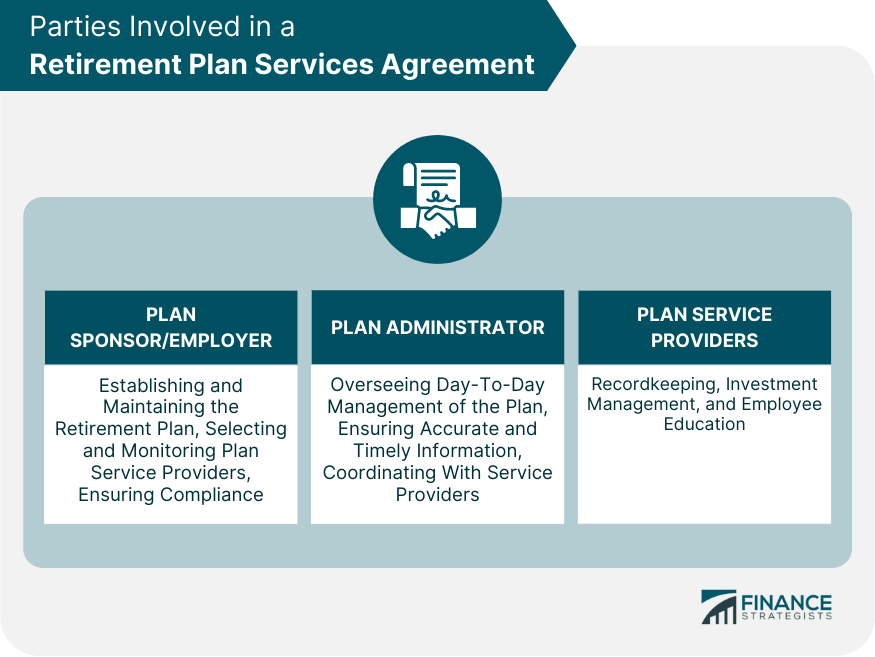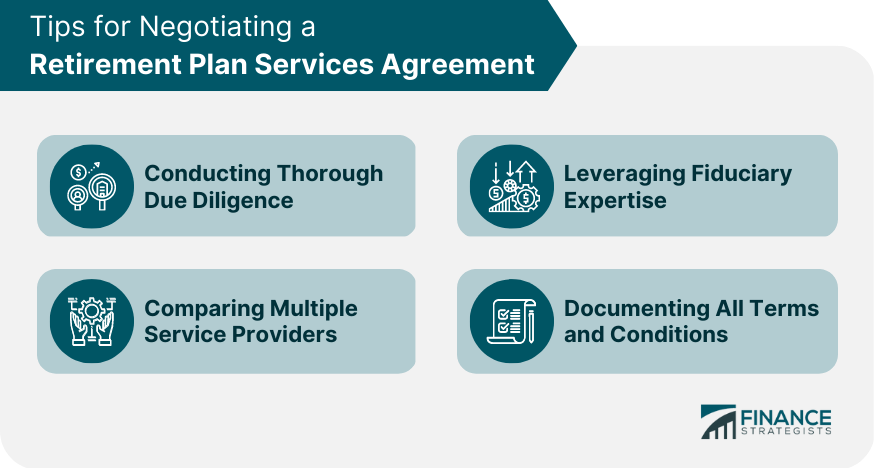A Retirement Plan Services Agreement is a legally binding contract between a plan sponsor or employer, plan administrator, and plan service providers that outlines the roles, responsibilities, and fees associated with administering and managing a retirement plan. A well-structured Retirement Plan Services Agreement is crucial for ensuring the smooth operation of a retirement plan, maintaining compliance with regulations, and protecting the interests of all parties involved, including the plan participants. The plan sponsor or employer is responsible for establishing and maintaining the retirement plan, selecting and monitoring plan service providers, and ensuring the plan complies with applicable laws and regulations. The plan administrator is responsible for overseeing the day-to-day management of the retirement plan, ensuring that plan participants receive accurate and timely information about their accounts, and coordinating with plan service providers. Plan service providers offer various services to retirement plans, such as recordkeeping, investment management, and employee education. They are typically third-party organizations that are contracted by the plan sponsor or employer. Recordkeeping services involve maintaining accurate records of plan participants' account balances, contributions, and investment allocations. Investment management services include selecting and monitoring investment options, managing the plan's investment portfolio, and providing investment advice to plan participants. Employee education and communication services involve providing plan participants with information about the retirement plan, investment options, and strategies for achieving their retirement goals. Fees and expenses in a Retirement Plan Services Agreement may include both direct fees, such as administrative and investment management fees, and indirect fees, such as revenue sharing or soft-dollar arrangements. Retirement plan service providers must disclose all fees and expenses associated with their services, allowing plan sponsors and participants to make informed decisions about the cost-effectiveness of the services provided. The plan sponsor has a fiduciary duty to act in the best interest of plan participants, ensuring that the retirement plan is managed prudently and in compliance with applicable laws and regulations. Service providers also have fiduciary responsibilities, depending on the nature and scope of their services. These may include acting in the best interest of plan participants, providing unbiased investment advice, and disclosing conflicts of interest. Service level agreements (SLAs) outline the specific performance standards and expectations for plan service providers, including response times, accuracy, and quality of services. Investment performance benchmarks are used to measure and compare the performance of the retirement plan's investments against industry standards and to evaluate the effectiveness of the plan's investment strategy. Retirement Plan Services Agreements should include provisions outlining the measures that service providers must take to protect the confidentiality and security of plan participants' personal and financial data. The agreement should also detail the service provider's responsibilities and procedures in the event of a security breach, including notifying the plan sponsor and participants and taking corrective actions to prevent future breaches. The Retirement Plan Services Agreement should specify the conditions under which the contract can be terminated, such as for cause or convenience, and the notice period required for termination. The agreement should outline the process and support services provided by the outgoing service provider during the transition period, ensuring a seamless handover to the new service provider and minimizing disruption to the retirement plan and its participants. Regularly reviewing and updating Retirement Plan Services Agreements is essential for ensuring that the retirement plan complies with current laws and regulations, such as the Employee Retirement Income Security Act (ERISA) and the Internal Revenue Code. Periodic reviews of the Retirement Plan Services Agreement can help plan sponsors assess the reasonableness of the fees and expenses charged by plan service providers, ensuring that the costs align with industry standards and provide value for the services rendered. Regular assessments of service provider performance against the standards and benchmarks outlined in the Retirement Plan Services Agreement can help plan sponsors identify areas for improvement and ensure that plan participants receive high-quality services that meet their needs. Before entering into a Retirement Plan Services Agreement, plan sponsors should conduct thorough due diligence on prospective service providers, evaluating their experience, expertise, and reputation in the industry. Comparing the offerings, fees, and performance of multiple service providers can help plan sponsors identify the best fit for their retirement plan and negotiate more favorable terms in the Retirement Plan Services Agreement. Plan sponsors may consider engaging the services of a fiduciary expert or consultant to assist in negotiating and reviewing Retirement Plan Services Agreements, ensuring that the interests of the plan and its participants are protected. All terms and conditions of the Retirement Plan Services Agreement should be clearly documented in writing, including the scope of services, fees and expenses, fiduciary responsibilities, performance standards, confidentiality and data security provisions, and termination and transition provisions. A well-structured Retirement Plan Services Agreement is crucial for ensuring the smooth operation of a retirement plan, protecting the interests of all parties involved, and maintaining compliance with applicable laws and regulations. Plan sponsors should regularly review and update their Retirement Plan Services Agreement to ensure that it remains current, reflects the changing needs of the plan and its participants, and continues to provide value for the services rendered. By carefully negotiating, documenting, and reviewing Retirement Plan Services Agreements, plan sponsors can help ensure the ongoing success and compliance of their retirement plans, providing their employees with a secure and well-managed path to retirement.What Is a Retirement Plan Services Agreement?
Parties Involved in a Retirement Plan Services Agreement
Plan Sponsor or Employer
Plan Administrator
Plan Service Providers

Key Components of a Retirement Plan Services Agreement
Scope of Services
Recordkeeping
Investment Management
Employee Education and Communication
Fees and Expenses
Direct and Indirect Fees
Fee Disclosure Requirements
Fiduciary Responsibilities
Plan Sponsor's Duties
Service Provider's Duties
Performance Standards and Benchmarks
Service Level Agreements
Investment Performance Benchmarks
Confidentiality and Data Security
Data Protection Measures
Security Breach Response Plan
Termination and Transition Provisions
Termination Conditions
Transition Services and Support
Importance of Regularly Reviewing Retirement Plan Services Agreements
Ensuring Plan Compliance With Regulations
Evaluating Fees and Expenses for Reasonableness
Assessing Service Provider Performance
Tips for Negotiating a Retirement Plan Services Agreement
Conducting Thorough Due Diligence
Comparing Multiple Service Providers
Leveraging Fiduciary Expertise
Documenting All Terms and Conditions

Conclusion
Importance of a Well-Structured Retirement Plan Services Agreement
Regularly Reviewing and Updating the Agreement as Needed
Ensuring the Retirement Plan's Ongoing Success and Compliance
Retirement Plan Services Agreement FAQs
A retirement plan services agreement is a legal contract between an employer and a retirement plan service provider, such as a recordkeeper, third-party administrator, or investment advisor. The agreement outlines the services that the provider will offer, the fees that will be charged, and the responsibilities of each party.
Retirement plan services agreements can cover a wide range of services, including plan design, implementation, recordkeeping, compliance, investment management, and participant education.
The key elements of a retirement plan services agreement include a description of the services being provided, the fees that will be charged, the responsibilities of each party, the term of the agreement, and any termination or renewal provisions.
A retirement plan services agreement is important because it helps ensure that the employer and service provider have a clear understanding of their respective roles and responsibilities, and that the fees and services being provided are reasonable and appropriate.
Employers can negotiate a retirement plan services agreement by comparing proposals from multiple service providers, requesting detailed information on fees and services, and negotiating the terms of the agreement to ensure that it meets their needs and objectives. It can also be helpful to work with a retirement plan consultant or attorney to review and negotiate the agreement.
True Tamplin is a published author, public speaker, CEO of UpDigital, and founder of Finance Strategists.
True is a Certified Educator in Personal Finance (CEPF®), author of The Handy Financial Ratios Guide, a member of the Society for Advancing Business Editing and Writing, contributes to his financial education site, Finance Strategists, and has spoken to various financial communities such as the CFA Institute, as well as university students like his Alma mater, Biola University, where he received a bachelor of science in business and data analytics.
To learn more about True, visit his personal website or view his author profiles on Amazon, Nasdaq and Forbes.















